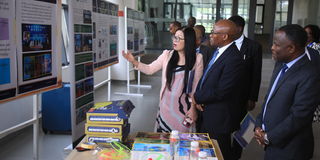Experts: How technology can alleviate Tanzania’s teacher shortage

What you need to know:
- Participants of the Second China-Africa Forum on Science Education held at the University of Dar es Salaam on Friday, July 12, 2024, highlighted Tanzania's pressing educational challenges, notably the acute shortage of teachers and learning materials
Dar es Salaam. Education experts have highlighted how the immense potential of digital technologies can be used to address the longstanding shortage of teachers and inadequate educational materials.
Participants in the Second China-Africa Forum on Science Education held at the University of Dar es Salaam on Friday, July 12, 2024, they highlighted Tanzania's pressing educational challenges, notably the acute shortage of teachers and learning materials.
They proposed an approach involving policy reforms, substantial investment in digital infrastructure, and active community engagement.
They emphasised that embracing technological advancements would provide a lasting solution to these challenges.
During the forum, Prof Huang Xiao from Zhejiang Normal University (China) underlined how digital technologies could alleviate various educational challenges while simultaneously reducing time loss and costs.
"Digital technologies have opened new avenues in education. Today, students can access world-class education online without the need for physical presence, mitigating barriers such as geographical constraints and health crises," remarked Prof Huang.
This digital shift is particularly pertinent for Tanzania, where the current teacher deficit is acute.
In the financial year 2022/23, the country needed 70,327 science and mathematics teachers but had only 23,647, a shortage of 66 percent.
Projections indicate that by 2026, with an estimated 23.6 million students in early childhood, primary, and secondary education, the demand for teachers will soar to at least 724,000.
Currently, Tanzania hires an average of 10,000 teachers per year, a rate that would require over 18 years to bridge the existing gap.
Prof Huang’s insights were echoed by local experts like Dr Calvin Swai from the University of Dodoma (UDOM), who emphasises the government’s efforts to supply digital tools, such as computers and tablets.
"Effective digital education requires adequate equipment and reliable internet access, particularly in rural areas," Dr Swai noted.
He also pointed out the necessity of training teachers in technological literacy to maximise the benefits of digital tools in education.
Resistance to technological adoption among some educators is another hurdle because, despite receiving digital devices, some teachers remain hesitant to integrate these tools into their teaching practices.
This reluctance underscores the need for comprehensive training and support to ensure that technology is utilised effectively.
Prof Leonard Msele, from UDOM, emphasises the need for collective responsibility in embracing technology.
"Everyone must view themselves as part of the solution, incorporating technology into our daily lives to foster educational progress," he stated.
The forum’s opening address by the Director of Higher Education at the Ministry of Education, Science, and Technology, Prof Peter Msoffe, highlighted the alignment of the forum’s objectives with the government’s curriculum reforms.
"These discussions are timely and support our ongoing efforts to integrate technology into the country’s education," said Prof Msoffe.
The University of Dar es Salaam (UDSM) Vice Chancellor, Prof William Anangisye, further illustrated the university’s commitment by allocating Sh3 billion annually for research, including technological advancements.
"Research provides critical insights into current challenges and informs the steps needed to achieve significant technological progress," Prof Anangisye explained.




